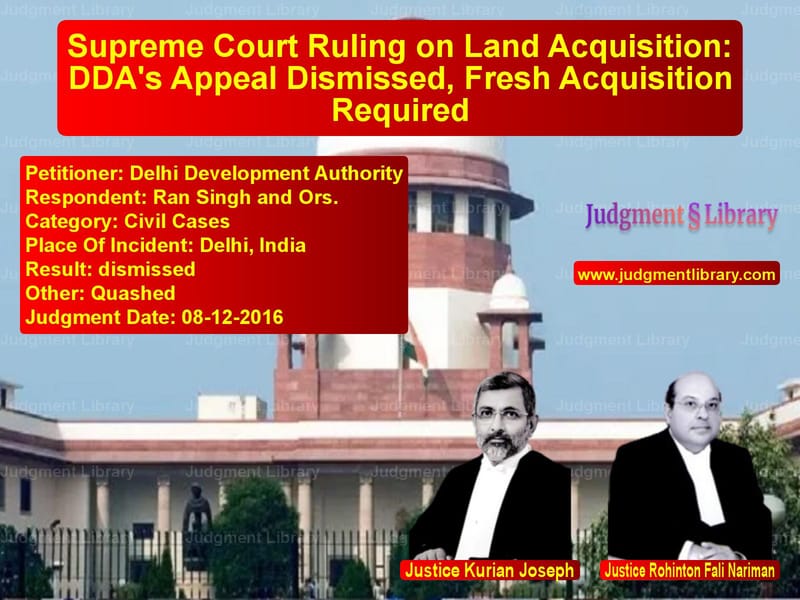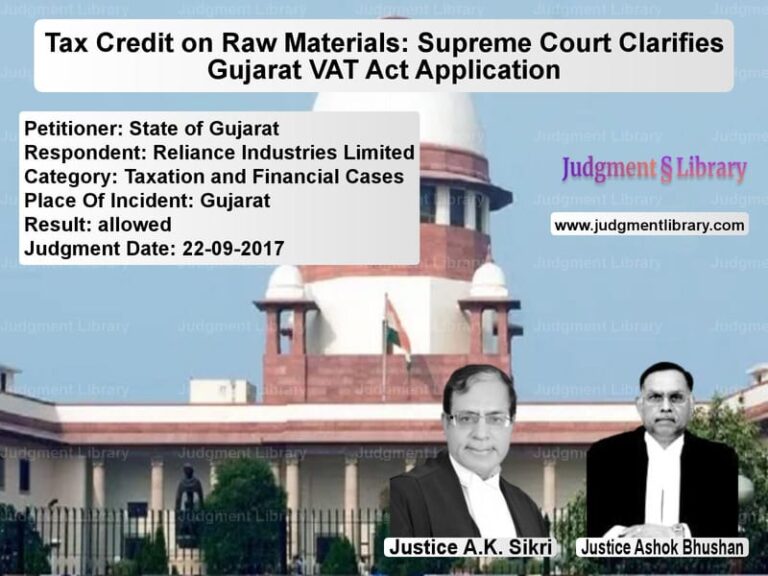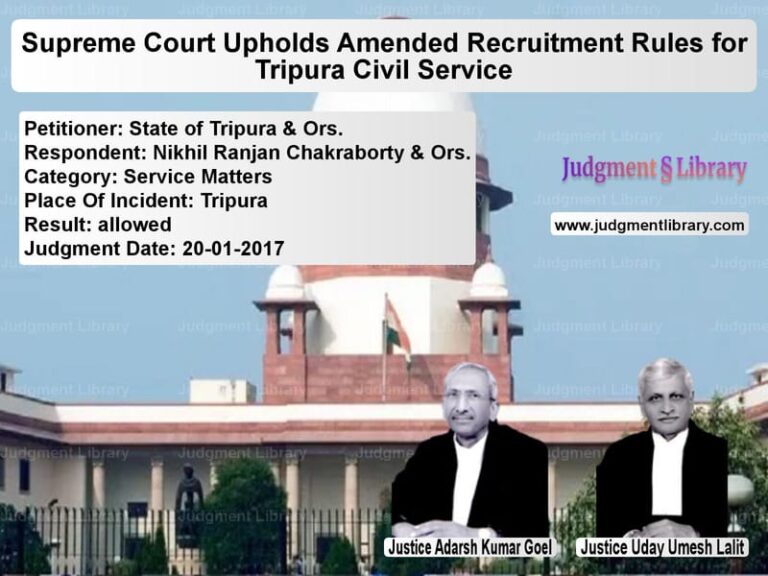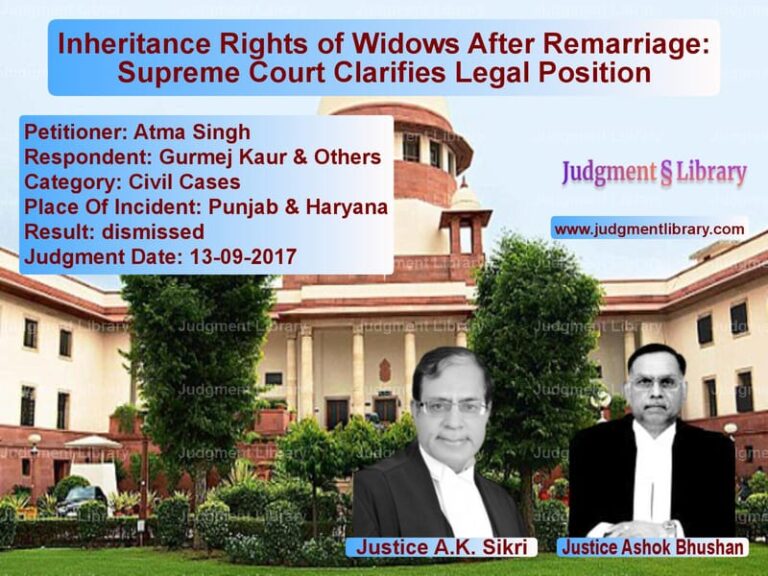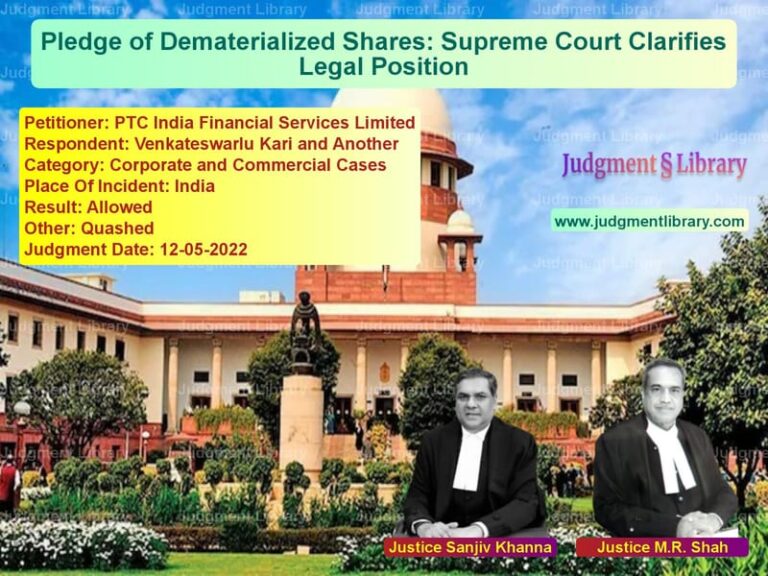Supreme Court Ruling on Land Acquisition: DDA’s Appeal Dismissed, Fresh Acquisition Required
The case of Delhi Development Authority vs. Ran Singh & Ors. dealt with the issue of land acquisition under the Right to Fair Compensation and Transparency in Land Acquisition, Rehabilitation and Resettlement Act, 2013 (LARR Act). The Supreme Court dismissed the Delhi Development Authority’s (DDA) appeal, ruling that the DDA was required to initiate fresh acquisition proceedings, in line with the LARR Act, after the lapse of the original acquisition proceedings.
Background of the Case
The Delhi Development Authority (DDA) had acquired land in Delhi for public purposes under the Land Acquisition Act, 1894, but the acquisition proceedings were challenged by the landowners. The main issue at hand was whether the acquisition process had lapsed under the LARR Act, 2013, as compensation had not been paid, and possession had not been taken within the statutory period. The DDA argued that the acquisition had been completed and that it had the legal right to retain possession of the land.
The matter eventually reached the Supreme Court, where the DDA sought relief, arguing that the original acquisition should be upheld, and that the process had been properly executed under the previous law.
Key Legal Issues
- Whether the acquisition proceedings were valid under the LARR Act, 2013, in light of the non-payment of compensation and non-possession of the land.
- Whether the DDA could retain possession of the land despite the lapse of the original acquisition proceedings.
- What are the obligations of the DDA under the LARR Act in terms of compensation, possession, and initiation of fresh proceedings?
Arguments by the Petitioners (Delhi Development Authority)
- The original acquisition proceedings were completed under the Land Acquisition Act, 1894, and the land was in possession of the DDA.
- The respondents did not challenge the acquisition within the prescribed time, thus forfeiting their right to claim compensation under the LARR Act.
- The DDA had carried out all the necessary steps for the acquisition, and any failure to pay compensation or take possession was not the responsibility of the authority.
- The LARR Act should not apply retrospectively to acquisitions completed under the old law.
Arguments by the Respondents (Landowners)
- Section 24(2) of the LARR Act mandates that if compensation is not paid and possession is not taken within five years of the date of the award, the acquisition is deemed to have lapsed.
- In this case, the DDA had failed to meet the statutory requirements of compensation and possession under the LARR Act.
- The landowners had not been compensated or given possession, and as per the LARR Act, their land should be returned to them.
Supreme Court’s Judgment
The Supreme Court ruled in favor of the landowners, stating:
- The acquisition had lapsed under Section 24(2) of the LARR Act due to the non-payment of compensation and the failure to take possession of the land.
- The DDA was granted a period of one year to initiate fresh acquisition proceedings under the provisions of the LARR Act, 2013.
- If no fresh acquisition proceedings were initiated within the one-year period, the DDA, if in possession of the land, must return the physical possession to the landowners.
The Court stated:
“In case no fresh acquisition proceedings are initiated within the said period of one year by issuing a Notification under Section 11 of the Act, the appellant, if in possession, shall return the physical possession of the land to the owner.”
Analysis of the Judgment
The Supreme Court’s judgment emphasized the importance of adhering to the procedural requirements of the LARR Act, particularly the timely payment of compensation and taking possession of the land. The Court highlighted that landowners cannot be denied their rights to fair compensation, and any delay or failure in the acquisition process would render it null and void.
The ruling clarified that acquiring authorities must comply with the LARR Act’s provisions to ensure that acquisitions are carried out transparently and fairly, ensuring the protection of landowners’ rights. The Court’s direction to the DDA to initiate fresh proceedings reinforces the need for proper legal procedures to be followed.
Impact of the Judgment
- Fair Compensation: The judgment ensures that landowners receive fair compensation as required by the LARR Act, ensuring equitable treatment for those whose land is acquired by the state.
- Legal Clarity: This ruling provides clarity on the application of Section 24(2) of the LARR Act and reaffirms that the failure to meet compensation and possession deadlines results in the lapse of acquisition.
- Protection of Landowners’ Rights: The decision strengthens the rights of landowners, ensuring that they are not unfairly deprived of their land without proper compensation.
- Encourages Proper Procedure: The Court’s ruling encourages authorities to adhere to due process when acquiring land for public purposes and ensures that landowners are treated fairly.
Conclusion
The Supreme Court’s ruling on the Delhi Development Authority’s appeal emphasizes the need for authorities to act in accordance with the LARR Act to protect the rights of landowners. The judgment ensures that landowners are compensated fairly and that acquisition processes are not unduly delayed. It also clarifies the procedure for initiating fresh acquisition proceedings and the legal obligations of the acquiring authority.
Don’t miss out on the full details! Download the complete judgment in PDF format below and gain valuable insights instantly!
Download Judgment: Delhi Development Au vs Ran Singh and Ors. Supreme Court of India Judgment Dated 08-12-2016.pdf
Direct Downlaod Judgment: Direct downlaod this Judgment
See all petitions in Property Disputes
See all petitions in Judgment by Kurian Joseph
See all petitions in Judgment by Rohinton Fali Nariman
See all petitions in dismissed
See all petitions in Quashed
See all petitions in supreme court of India judgments December 2016
See all petitions in 2016 judgments
See all posts in Civil Cases Category
See all allowed petitions in Civil Cases Category
See all Dismissed petitions in Civil Cases Category
See all partially allowed petitions in Civil Cases Category

